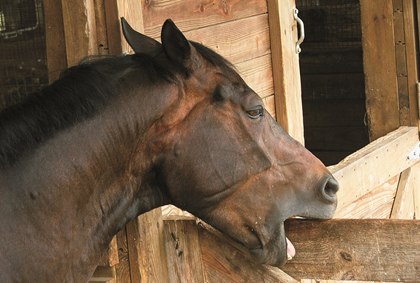
Effects of meal frequency on behaviour of stabled horses
A pilot study was used to record frequency of stereotypic behaviour and to select horses for the main study. Thirty horses were observed from 08:00 to 09:00 and from 16:00 to 17:00 hours. Horses performed more stereotypical behaviours during the afternoon. This was related to limited access to forage. Furthermore, there was a significant lower incidence of oral stereotypical behaviour in horses on straw compared to horses on shavings and paper.
For the main study a total of eighteen horses were used, divided in a treatment and control group. The treatment group consisting of nine horses received their daily four kilo ration as two conventional two kilo meals (weekend 1), four one kilo meals (weekend 2) and six equally sized meals (weekend 3). The remaining nine horses received their four kilo of concentrate at 8:30 and at 16:30 (control group).
Horses in the treatment group showed a decrease in oral stereotypies as the frequency of meals increased. However, an increase in weaving and nodding was observed prior to feeding. The control group showed a significant increase in weaving, nodding and oral stereotypies as the treatment group received more meals. An overall increase in stereotypical behaviour for both the treatment and control group was observed, suggesting anticipatory response to feeding time. Dividing concentrate feed into smaller portions may, therefore, decrease the incidence of oral stereotypies but may increase stereotypies such as weaving or nodding.
> Cooper et al., Appl. Anim. Behav. Sci. 90 (2005) 351-364. All rights reserved to Elsevier B.V. Click here for the full-text article


